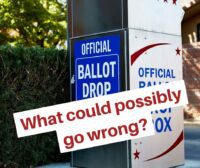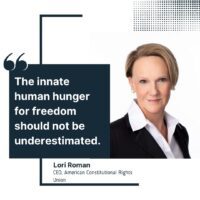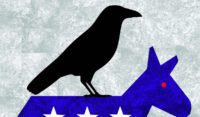Not so long ago, Americans assembled on one designated day — Election Day — to choose our national leaders.
For those unable to cast votes on Election Day, early voting and absentee ballots are available options. In-person early voting has the advantage of the individual citizen at a polling place after check-in by election officials.
Today, however, early voting periods have been stretched to absurd lengths, with some states beginning their voting for the November election more than a month or more in advance. There is no empirical evidence that early voting increases turnout, but it does have serious downsides, including:
-
- Producing less-informed voters. After casting an early ballot, a voter checks out of the national debate regardless of what happens. They won’t care about the televised debates, won’t consider options, and won’t fully participate in the political process. Many voters have occasionally complained to election officials and representatives of a desire to recast their vote because they have changed their mind. In most, if not all states, this is impossible to do with early voting.
- Increasing election administration and campaign costs. Elections that drag on for weeks require the logistical costs of administering an election, including more poll workers and salaries associated with the voting process.
- Facilitating double voting and vote fraud. Counties that utilize early voting need to have the necessary technology to ensure simultaneous verification and record of vote history. Early voting allows voters to vote anywhere in the county, not simply in their precinct. The jurisdictions must have the necessary voting equipment, statewide registration system, and electronic poll book system to prevent individuals from voting more than once in the state or county during the early voting period. It is also more difficult for political parties to secure sufficient poll watchers to monitor polling places for an extended early voting period.
ACTIVITY
Watch: 24 Videos of AZ Voters Documenting Spoiled Ballots, Broken Tabulators, and the Dreaded ‘Box 3’
There is nothing more tantamount to American democracy than the right to vote. Given that fact, it would only make entirely too much sense to make voting as safe, secure and efficient as possible. So then why isn’t it?
JASON SNEAD: America’s Electoral System Is Suffering From A Credibility Crisis
Defying all predictions of a photo finish senate race, Pennsylvania Democrat John Fetterman won 50.3% of the vote to Republican Dr. Mehmet Oz’s 47.3%. The unexpectedly large margin helped avoid a midterm meltdown. But don’t be deceived; that margin masks major electoral system dysfunction that remains unaddressed.
Von Spakovsky: As The Dust Settles From Election Day, A Mixed Victory For Election Integrity Appears
The final results in the Nov. 8 elections heralded several important changes to state election-integrity laws across the country. While some of the initiatives, approved via ballot referendums, will improve the integrity of state elections, others are more invidious, making elections in those states more insecure.
It’s Not Too Late to Protect Our Elections
We're hearing many states are still struggling to staff poll workers for the upcoming elections. One of the most important things we can do to defend free and fair voting is to get involved and be present when and where votes are cast.
Many broke the law by dropping off multiple ballots in 2021 election, but no one will be prosecuted, Lehigh DA says
Lehigh County District Attorney Jim Martin said Monday his office will not prosecute anyone identified as having deposited more than one mail-in ballot into drop boxes around the county during the 2021 election.
Arizona Democrats File Last Minute Lawsuit Seeking to Block 2020 Election Audit
The Arizona Democratic Party filed a lawsuit on Thursday seeking to stop the state’s Senate from carrying out an audit of the 2020 election results in Maricopa County.
ACRU’s Blackwell: How low will Democrats go on pushing Jim Crow narrative?
Many on the left claim that voting integrity measures, such as voter ID, are throwbacks to the Jim Crow era. Since Jim Crow laws were enacted by Southern Democrats to force racial segregation and block economic and political power among Black Americans, Democrats should know their current claims are preposterous. As the old saying goes, “they have a lot of nerve.”
Why We Black Leaders Support Voter ID Laws
America is a country of over 300 million people. We are comprised of every shape, size, nationality, and opinion. This diversity has proven to be one of our greatest strengths.However, if you listened to largely white liberal media personalities and elite CEOs, you wouldn’t know this. According to liberal orthodoxy, all Blacks think alike, and all Blacks support Black Lives Matter, and all Blacks oppose the recently enacted Georgia Election Integrity Act.
82 Percent of Arizona Voters Support Election Integrity Reforms: Stronger Voter ID, Voter Roll Cleanup
According to the latest polling of Arizona voters, a sweeping majority support strong voter ID requirements and cleaning up early vote-by-mail lists. A total of 550 voters were polled. 82 percent of them supported voter ID in general, with nearly 64 percent in support of requiring ID verification in order to vote by mail.
Burgess Owens Shreds Democrats’ Comparison Of Voter Integrity Laws To Jim Crow: I ‘Actually Experienced Jim Crow’ Laws
Congressman Burgess Owens (R-UT) on Tuesday slammed Democrats’ claims that Georgia’s new voter integrity laws are somehow comparable to Jim Crow laws. The freshman congressman shared his personal experience under Jim Crow, saying that it’s “extremely offensive” to make the assumption black Americans aren’t capable of getting a form of identification.



